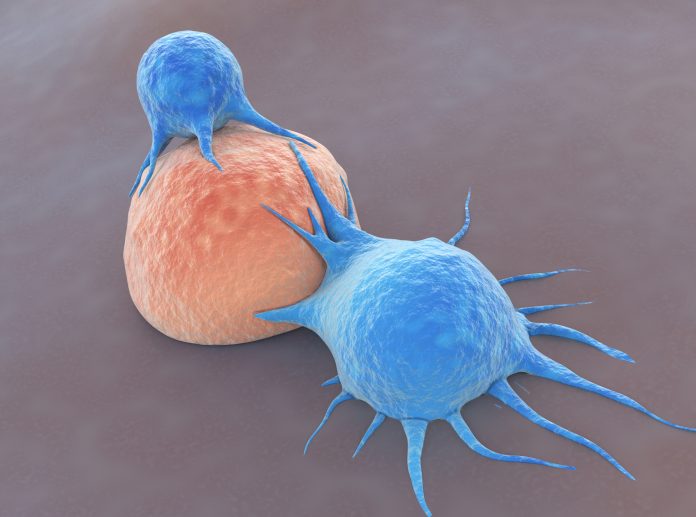
Key biologic features of tumor progression are influenced by the circadian rhythm, which could be used to optimize timing of drug delivery and maximize safety and efficacy, suggests a review carried out by researchers in Switzerland.
“The circadian rhythm governs most of the cellular functions implicated in cancer progression, and therefore its exploitation opens new promising directions in the fight against metastasis,” write Zoi Diamantopoulou and co-authors from the Institute of Molecular Health Sciences at the Swiss Federal Institute of Technology (ETH) in Zurich.
The review, published in Trends in Cell Biology references 110 published papers and broadly covers how the circadian rhythm impacts tumor development and progression and discusses how chronotherapy—the delivery of treatment at a specific time of day—may pave the way for more effective anticancer treatments.
The authors report that there is now “a considerable amount of evidence,” including epidemiological studies, clinical data, and basic research that highlights a connection between circadian rhythm disruption and cancer. So much so, that shift-work involving circadian disruption is classified “as a probable human carcinogen” by the International Agency for Research on Cancer.
Increased risks for breast, endometrial, prostate, colorectal, and lung cancers have all been associated with night-shift work. However, other studies have found no such connection and Diamantopoulou and colleagues urge caution when interpreting data which may be susceptible to multiple confounding factors. “[I]t is well known that night-shift work is linked to sleep deprivation, circadian misalignment, and lifestyle disturbances such as irregular feeding, alcohol consumption, smoking, and lack of physical activity, which are all likely additional contributing factors to altered cancer susceptibility,’ they write.
The authors explain that the circadian rhythm is a homeostatic mechanism that living organisms have developed to synchronize and adjust their body functions to daily changes of the environment. Yet they point out that, for most tumor types analyzed, the malignant cells do not have a functional circadian clock. The cells do, however, respond to external influences, including those dependent on the circadian rhythm.
In terms of cancer progression, several studies have shown that the generation of circulating tumor cells (CTCs) occurs in a diurnal pattern, suggesting that metastasis is regulated by the circadian rhythm.
Indeed, a recent analysis of CTCs from patients with breast cancer showed that the cells are responsive to circadian circulating hormones that impact their proliferation status. This means that the rate at which cancer cells detach from the tumor mass and penetrate through the blood vessels into the blood stream changes throughout the day and is highest during the rest phase.
Other studies have shown a similar phenomenon in prostate cancer and multiple myeloma, but in these cancer types, CTC numbers peaked at different timepoints during the day, suggesting that the processes involved might be cancer type-dependent.
Knowing that cancers are impacted by circadian variations has led researchers to investigate the utility of chronotherapy for three main reasons, say Diamantopoulou et al. 1) The expression and/or activity of each drug target may not be constant throughout the day; 2) the development of adverse effects and toxicity may be circadian clock-regulated; 3) the pharmacokinetics and pharmacodynamics of the drug may vary with time of day.
And many of these studies have shown that the time of day matters in terms of both efficacy and toxicity. For example, ovarian cancer patients receiving adriamycin in the morning and cisplatin in the evening experienced less toxicity than patients receiving adriamycin in the evening and cisplatin in the morning, while a study in patients with acute lymphoblastic leukemia patients treated with 6-mercaptopurine and methotrexate showed that disease-free survival rates were high in those given the medication after 17:00h relative to those who were treated before 10:00h.
Furthermore, a recent study among patients with stage IV malignant melanoma receiving infusions containing immune checkpoint inhibitors ipilimumab, nivolumab, and/or pembrolizumab demonstrated that those treated before 16:30h had nearly twice the overall survival rate of those given the treatment after 16:30h.
At present, routine practice for biopsy collection does not consider how biomarkers might be differentially expressed throughout the day, even though it is known that markers such as Ki67, which is broadly used for both cancer classification and as a prognostic marker, display a diurnal pattern.
“Future implementation of these concepts will be instrumental for the development of a time-controlled classification system that would allow the optimal timing of the biopsy procedure to be determined,” Diamantopoulou and co-authors suggest. “Additional clinical efforts are encouraged because implementation of circadian clinical practices can be crucial for accurate cancer diagnosis and for optimizing the clinical management of cancer patients,” they write.
The researchers also acknowledge that awareness of a link between circadian rhythm and metastasis might cause anxiety in cancer patients with regard to their sleeping habits, but believe that the “identification of circadian rhythm-based metastasis formation should instead be seen as a (previously underappreciated) opportunity to intervene in the most timely and effective way.”
Diamantopoulou and team conclude that several questions remain unanswered including how the knowledge of circadian variations can be used to develop novel therapies targeting metastasis and how improved mechanistic understanding of chronotherapy is necessary before it can fully reach its clinical potential.
They say: “These insights may bring us one step closer to the development of successful antimetastatic chronotherapeutics and personalized treatment.”













